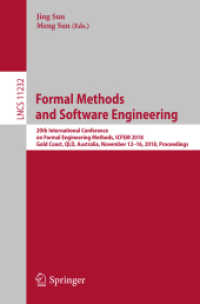- ホーム
- > 洋書
- > 英文書
- > Politics / International Relations
Full Description
Arabs make up approximately 20 percent of the population within Israel's borders. Until the 1970s, Arab citizens of Israel were a mostly acquiescent group, but in recent decades political activism has increased dramatically among members of this minority. Certain activists within this population claim that they are a national and indigenous minority dispossessed by more recent settlers from Europe. Ethnically based political organizations inside Israel are making nationalist demands and challenging the Jewish foundations of the state. Palestinian Ethnonationalism in Israel investigates the rise of this new movement, which has important implications for the Palestinian-Israeli conflict as a whole.
Political scientist Oded Haklai has written the first book to examine this manifestation of Palestinian nationalism in Israel. Drawing on extensive fieldwork and interviews with key figures, Haklai investigates how the debate over Arab minority rights within the Jewish state has given way to questioning the foundational principles of that state. This ground-breaking book not only explains the transitions in Palestinian Arab political activism in Israel but also presents new theoretical arguments about the relationship between states and societies. Haklai traces the source of Arab ethnonationalist mobilization to broader changes in the Israeli state, such as the decentralization of authority, an increase in political competition, intra-Jewish fragmentation, and a more liberalized economy.
Palestinian Ethnonationalism in Israel avoids oversimplified explanations of ethnic conflict. Haklai's carefully researched and insightful analysis covers a neglected aspect of Israeli politics and Arab life outside the West Bank and Gaza. Scholars and policy makers interested in the future of Israel and peace in the Middle East will find it especially valuable.
Contents
Note on Transliteration
Introduction
1. Transitions in Minority Political Activism, Grievances, and Institutional Configurations
2. State Formation and the Creation of National Boundaries
3. State Autonomy, Marginalization, and Grievances
4. From Quiescence to the Communist Party
5. The Ethnonational Turn
6. The Changing Israeli State-Society Relations
Conclusion
Notes
Bibliography
Index
Acknowledgments






